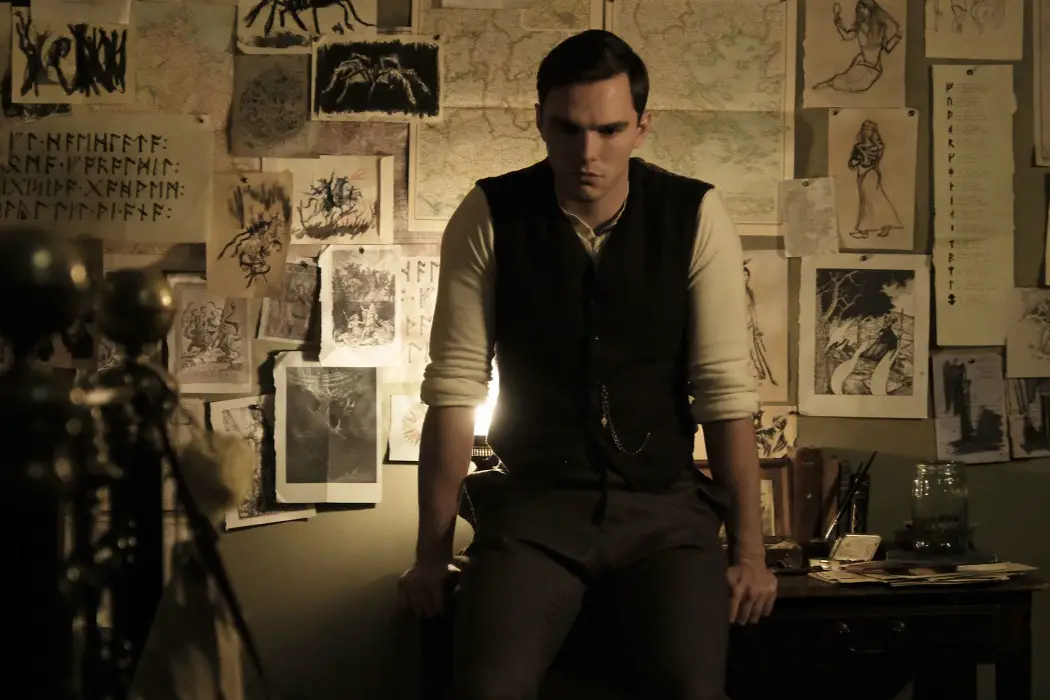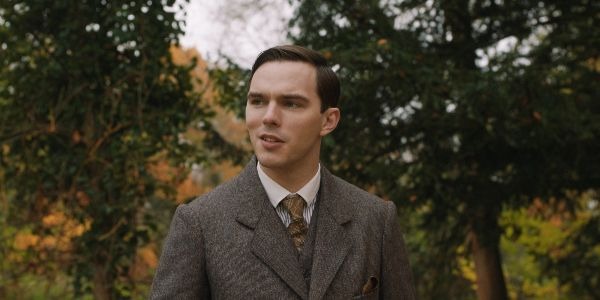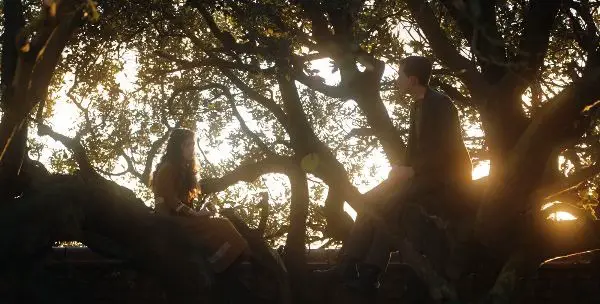TOLKIEN: A Classically Told Biopic

I'm a geeky, yet lovable film fan who adores horror…
Here’s a funny story: Dome Karukoski, the director of Tolkien, once came to my school to do a talk. The year must have been 2008 or 2009 and I hid in the back row with my emo haircut and braces. He projected his laptop screen onto a huge canvas set up in the foyer in front of hundreds of students. His wallpaper was a picture of a man with a scraggly beard and Karukoski asked us to raise our hand if we knew who the fella was.
A handful of students, me included, raised their hands, but most remained confused who this old chap was. Karukoski asked one of the students at the front to reveal the answer. It was Stanley Kubrick. I felt oddly proud and giddy to have known the answer. That moment has stuck with me for some reason. I was already very much into films and cinema, but I think this might have been a very defining moment for me.
Maybe it’s because Karukoski grew up a mere 10 minutes from where I grew up, in a very small town in Finland. He’s a well-known auteur in Finland with the most impressive CV. The small town where we both are from doesn’t even have a cinema, and the best access to films was the pull-out shelves at the local library. So regardless of my opinion of the film, I am immensely proud to review Tolkien and incredibly excited that this film exists.
Before Lord Of The Rings
Tolkien focuses on John Ronald Reuel’s early years. The film covers his life from early teens to adulthood, but not quite up to writing his Middle Earth stories. It’s a bold move, because most LOTR fans will complain about the lack of hobbits and wizards. Tolkien’s experiences in school, Oxford University and the trenches of World War I will shape the writer and translate into his fantasy books.

As a biopic, Tolkien is classical and traditional. It’s very predictable, which is both a compliment and a complaint. The story follows familiar beats and doesn’t offer anything new or exciting in terms of genre or story, but it’s elegantly made and constantly gorgeous to look at. Karukoski has brought on a fellowship of his own to work on Tolkien: both editor Harri Ylönen and cinematographer Lasse Frank have worked with Karukoski before and the film is beautifully crafted, if a little uneven.
The film’s best parts are the war scenes. The scenes are staged immaculately and are equally harrowing and beautiful, a masterful mix of narrative and craft. Here is where Karukoski truly shines. The trenches are flooded with the blood of the soldiers and the sky is filled with mustard gas. It’s a powerful visual image and while the occasional shadow or burst of flames suggest fantastical elements, they’re much subtler than one would assume. The fantastical elements are, well… fantastic.
The intentions are clear, but dragons and orcs are never forcibly shoved down your throat. The beautifully realised war scenes have moments of genuine terror and they become the unlikely frame narrative within the film with Tolkien remembering his early life while suffering from trench fever in the front lines and trying to find his friend Geoffrey.
A Wobbly Masterclass In Craft And Performance
The film’s sound design, especially in the war scenes and the use of lighting raise the film from a dry, stuffy film to something a bit more special. Every frame in Tolkien is a beautiful one and the layered sounds of gun fire, explosions and the screams of dying men create memorable moments in a film that might have been forgettable by default. This is the issue with period biopics: how do you make yours special? How do you convey a sense of time and place without tripping over the same old clichés and color schemes? Karukoski and his team do an admirable job at making Tolkien stand out from the endless sea of biopics.
Tolkien never quite becomes as remarkable as its subject. It lacks rhythm and the pacing is off; it moves briskly in the beginning, covering Tolkien’s school years and then slows down significantly during his Oxford years, leaving the ending feeling a bit rushed. The film has so much to cover in the beginning, it falters under its own weight. Clocking in at under two hours, it never outstays its welcome, but we could have easily spent another 20 minutes with a film this handsomely made if it meant the film flowed better in the middle and end.

As for the performances, Nicholas Hoult does a fine job as Tolkien. Harry Gilby as the younger Tolkien is also impressive and for once, the child actor looks like they might grow into their older counterpart. Hoult has the right amount of old school charisma to carry the weight of the film, but also brings some sensitivity into his role. His performance is largely internalised, sometimes too much so and much is communicated with looks and Tolkien’s refusal to make eye contact or face things.
While Hoult’s performance might be a toned down one, it never lacks soul and the actor breathes life into one of the greatest fantasy writers ever. Tolkien is someone we all know about, but none of us can say we knew intimately. I don’t even know what he looked like nor have I ever finished reading the massive opus that is LOTR. Karukoski and Hoult attempt to make Tolkien more than a name on a page, a man behind words and mostly succeed, but the film and the character are trapped in genre conventions and necessary narrative steps.
Lily Collins, such an underrated actress, has been served a terrible hand again. With Tolkien coming out in the same month as the Ted Bundy -film Extremely Wicked, Shockingly Evil and Vile, Collins is again playing a wife to the more notorious man in her life. Her Edith is certainly served better here than Liz in Extremely Wicked, but it’s a shame to see Collins in such thinly written roles when she certainly has the chops for something more.
Her Edith is a fascinating character, a woman with her own inner life and passions which she is unable to pursue mostly due to her place in society as a woman. In one fantastic scene Tolkien invites Edith for tea with his friends and when one of said friends engages in conversation about Wagner with Edith, Tolkien quickly pulls her out and the pair leave, only to argue on their way home. The scene promises much for the character, but most of this is sadly abandoned. Fair, considering this is a film about Tolkien and not Edith, but why tease us with it?
Tolkien: Stuffy Biopic Or A Fascinating Look Into The Life Of A Writer?
While Tolkien isn’t quite as exciting as one might hope, it’s a very decent film. It’s competently made, beautifully visualised and at times even excellent. Nicholas Hoult brings much needed heart and nuance into his performance as J.R.R. Tolkien. While the film fails to convey Tolkien’s need to write the stories he goes on to write, it’s a fascinating look into a mind of a writer and how our experiences shape and inspire us.
Director Dome Karukoski proves again that he is a director to keep an eye on. From his earlier Finnish films, to Tom of Finland and now Tolkien, Karukoski proves he has the necessary skills and flair to make it in big budget filmmaking. If I have one serious complaint, it’s that 20 minutes into the film, no one had made a cup of tea. Travesty!
Are you a fan of Tolkien? Did the film serve him well? Let us know in the comments!
Tolkien is now in cinemas in the UK and is released in the US May 10th.
Does content like this matter to you?
Become a Member and support film journalism. Unlock access to all of Film Inquiry`s great articles. Join a community of like-minded readers who are passionate about cinema - get access to our private members Network, give back to independent filmmakers, and more.
I'm a geeky, yet lovable film fan who adores horror cinema, musicals and my dog Geordie La Forge. I'm from Finland, but based in London.













